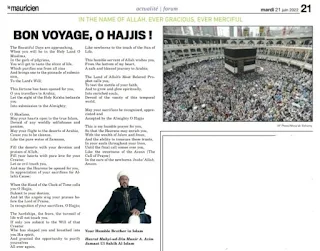
O Allah, the
call has been given,
And Your servants are coming to You,
To Your Glorious & Holy House,
To accomplish that very deed which represents
The Ultimate proof of their love and submission to You.
Submission to
You in all humility is what You seek,
And Forgiveness and Your Love and Mercy
Is what we seek;
Rush to Your servants, O Allah
And accept their Hajj;
Inspire their hearts to remain true to the promise of
Reform throughout the rest of their lives,
And O Allah open my way to You,
So that the treasures of Your Kingdom may be
Always at my reach,
To distribute to Your sincere and devoted servants.
May they also accede to Your nearness,
And taste Your Love and
Give them the ability,
To communicate with You,
Their hearts connected with You,
And Yours with them,
And enlighten them, O Allah
To be truly submissive to You,
In all aspects of the word;
A Muslim am I, O Allah,
By Your Grace and Mercy;
Bless my Muslim brothers, sisters and children,
Who have forsaken everything to come to
Your Holy Ka’aba,
To accomplish the fifth pillar of Islam,
To accomplish such a worship,
Which shall Insha-Allah see
to their
Glorious elevation in Your Sight and Paradise,
Be it in this world and the hereafter,
Forever.
O Allah, accept this plea,
And bless us all in Your way,
Under Your righteous Guidance,
And cherished in Your everlasting love,
And protect us always from the accursed Satan,
And all forms of evils which exist within us,
And all around us. Ameen.
.....By Hazrat Muhyi-ud-Din Munir A. Azim, Imam- Jamaat Ul Sahih Al Islam, 24 July 2019. First appeared in Le Mauricien and can be viewed here.



















